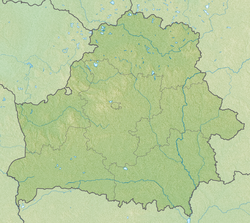Brest
| |
|---|---|

| |
| Coordinates: 52°08′05″N 23°39′25″E / 52.13472°N 23.65694°E | |
| Country | Belarus |
| Region | Brest Region |
| First mentioned | 1019 |
| Magdeburg city rights | 1390[1] |
| Government | |
| • Chairman of the Brest City Executive Committee | Siarhiej Labadzinski |
| • Chairman of the Brest City Council of Deputies | Mikalaj Krasouski |
| Area | |
| • Total | 145 km2 (56 sq mi) |
| Elevation | 280.4 m (919.9 ft) |
| Population (2024)[2] | |
| • Total | 344,470 |
| • Density | 2,400/km2 (6,200/sq mi) |
| Time zone | UTC+3 (MSK) |
| Postal code | 224000 |
| Area code | +375 (0)162 |
| License plate | 1 |
| Website | City executive committee's official website |
Brest, formerly Brest-Litovsk and Brest-on-the-Bug, Berestia,[a] is a city in Belarus at the border with Poland opposite the Polish town of Terespol, where the Bug and Mukhavets rivers meet, making it a border town. It serves as the administrative center of Brest Region and Brest District, though it is administratively separated from the district.[2] As of 2024, it has a population of 344,470.[2]
Brest is one of the oldest cities in Belarus and a historical site for many cultures, as it hosted important historical events, such as the Union of Brest and Treaty of Brest-Litovsk. Furthermore, the Brest Fortress was recognized by the Soviet Union as a Hero Fortress in honour of the defense of Brest Fortress in June 1941.
In the High Middle Ages, the city often passed between Poland, the principalities of Kievan Rus', and the Grand Duchy of Lithuania. From the Late Middle Ages, the city was part of the Grand Duchy of Lithuania, which later became a part of the Polish–Lithuanian Commonwealth from 1569. In 1795, it was incorporated into the Russian Empire with the Third Partition of Poland. After the Polish-Soviet War, the city became part of the Second Polish Republic. In 1939, the city was captured by Nazi Germany during the invasion of Poland and then transferred to the Soviet Union per the German–Soviet Frontier Treaty. In 1941, it was retaken by the Germans during Operation Barbarossa. In 1944, it was retaken by the Soviet Red Army during the Lublin–Brest offensive.[3] The city was part of the Byelorussian SSR until the breakup of the USSR in 1991. Since then, Brest has been part of independent Belarus.
- ^ Cite error: The named reference
jbwas invoked but never defined (see the help page). - ^ a b c "Численность населения на 1 января 2024 г. и среднегодовая численность населения за 2023 год по Республике Беларусь в разрезе областей, районов, городов, поселков городского типа". belsat.gov.by. Archived from the original on 2 April 2024. Retrieved 12 April 2024.
- ^ "BREST-LITOVSK, BREST, BRISK, BRESTYE, BERESTIE, BERESTOV, BRZESC, sometimes Russia or Poland and now Belarus - Jewish Genealogy - Searching for our ancestors". www.brest-belarus.com. Archived from the original on 9 May 2005. Retrieved 11 January 2022.
Cite error: There are <ref group=lower-alpha> tags or {{efn}} templates on this page, but the references will not show without a {{reflist|group=lower-alpha}} template or {{notelist}} template (see the help page).


